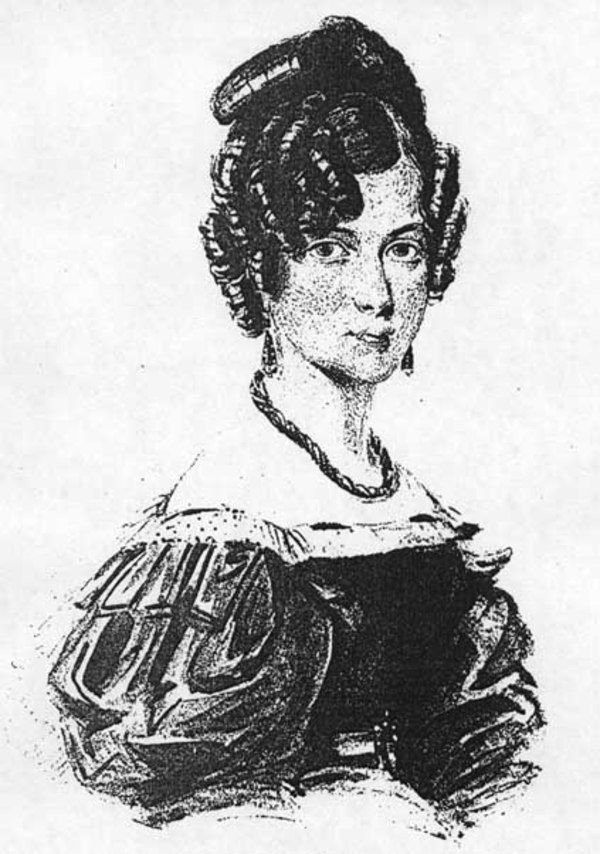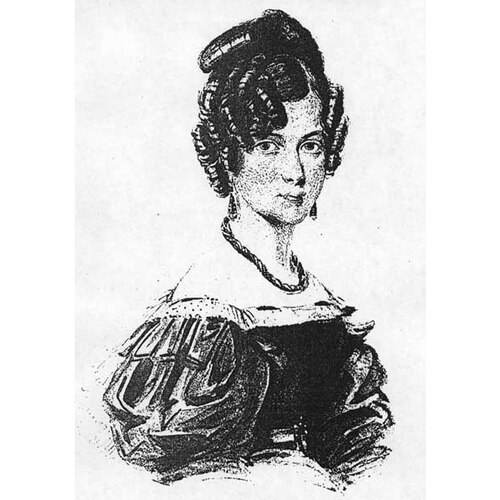
Source: Link
SIMPSON, FRANCES RAMSAY (Simpson, Lady Simpson), diarist; b. c. 1812 in London, second child of Geddes Mackenzie Simpson and Frances Hume Hawkins; m. there 24 Feb. 1830 George Simpson; d. 21 March 1853 in Lachine, Lower Canada.
Frances Ramsay Simpson, the daughter of a successful London merchant, was brought up with all the accomplishments and graces expected of a Victorian lady. In 1830 her middle-aged cousin George Simpson, governor of the Hudson’s Bay Company in North America, visited the Simpson household while on furlough and was so captivated by the sweet nature and genteel talents of the 18-year-old Frances that he quickly married her without much consideration as to whether one so young and delicate could successfully adapt to life in Rupert’s Land. After a brief honeymoon the governor and his bride sailed from Liverpool on 8 March for North America.
During the voyage Mrs Simpson was grateful to have the company of Catherine Turner, the Scottish bride of HBC chief factor John George McTavish*, for the parting from her family in London had caused her “bitter sorrow.” Although she was violently seasick during the ocean crossing, her health improved sufficiently after her arrival in Montreal for her to enjoy the canoe trip from Lachine to York Factory (Man.) in May and June. The two wives were the first British women ever to travel this route, and the diary that Mrs Simpson kept of their trip constitutes a unique record. She was awed by the magnificence of the scenery, admired the strength and skill of the voyageurs, two of whom were entrusted to carry the ladies over the portages, and was amused by the gallant attempts of the company’s officers to welcome her along the way. After her visit to the post on Rainy Lake (Ont.), it was renamed Fort Frances in her honour.
Frances Simpson’s arrival in Rupert’s Land had serious repercussions on fur-trade society. Most of the HBC officers had married native women “after the custom of the country.” But with the British marriage of Governor Simpson, who had himself cast aside a native wife and family, racial prejudice increased. Simpson determined that native women, regardless of the rank of their HBC husbands, should be excluded from respectable society, especially in the Red River settlement (Man.) where the Simpsons took up their winter residence.
The gracious manners of the governor’s lady and her delightful playing on the newly imported pianoforte made Frances Simpson “the brightest star” in Red River; but personally she was homesick and lonely, her female acquaintances being restricted to the few white wives of company officers such as Chief Factor Donald McKenzie and the missionaries William Cockran* and David Thomas Jones*. In the early months of 1831 Mrs Simpson’s health deteriorated rapidly as her first pregnancy advanced, and, despite the efforts of Dr William Todd, the lack of skilled medical attention compounded the difficult birth of her son, George Geddes, in September. The sudden death of this child the following spring was a grievous blow. Although his wife regained her strength somewhat during a trip to York Factory in the summer of 1832, Governor Simpson realized that he would have to take her back to her family in England if she were to recover fully. She was not strong enough to accompany him on his extensive travels throughout Rupert’s Land and he could not leave her in the inhospitable seclusion of Red River society.
After her return to London in 1833, Mrs Simpson received the best medical attention available but she remained a semi-invalid for the rest of her life. Subsequent pregnancies continued to weaken her physically; three daughters were born in England, in 1833, 1841, and 1843. Psychologically, she suffered from her husband’s habit of treating her like a child and from his long absences. In the summer of 1838 Simpson brought his wife temporarily to Lachine, and after leaving the family in England for several years while voyaging around the world, he decided to settle them permanently at Lachine in 1845. There, in Hudson’s Bay Company House, they lived with Chief Factor Duncan Finlayson* and his wife, Frances’s sister Isobel Graham Simpson*. Another child, John Henry Pelly, was born to the Simpsons in June 1850 and, never fully recovering from this confinement, Lady Simpson died at Lachine early in 1853.
To the fur-trade society of early 19th-century Rupert’s Land, Frances Simpson embodied the civilizing attributes of a Victorian lady; in her personal and family life, however, this role exacted a considerable sacrifice. As one HBC officer said of her in the early 1840s, the governor’s lady was a “pious creature who resigns herself patiently under all circumstances which will contribute to the Honor of her Gallant Knt.”
The correspondence between Frances Ramsay Simpson and her husband, Governor George Simpson, is included in the latter’s personal papers at PAM, HBCA, D.6/1. The journal she wrote during her canoe trip from Lachine to York Factory in 1830 is at PAM, HBCA, D.6/4. Historian Grace Lee Nute edited this account and wrote an introduction when she published it in the Beaver, outfit 284 (December 1953): 50–54; (March 1954): 12–17; and outfit 285 (summer 1954): 12–18.
ANQ-M, CE1-63, 24 mars 1853. PAM, HBCA, B.135/c/2; Edward Ermatinger corr., copy no.23. Mactavish, Letters of Letitia Hargrave (MacLeod). J. S. Galbraith, The little emperor; Governor Simpson of the Hudson’s Bay Company (Toronto, 1976). C. W. Mackenzie, Donald Mackenzie: “king of the northwest” . . . (Los Angeles, 1937). Sylvia Van Kirk, “The impact of white women on fur trade society,” The neglected majority: essays in Canadian women’s history, ed. Susan Mann Trofimenkoff and Alison Prentice (Toronto, 1977), 27–48. Van Kirk, “Many tender ties.”
Cite This Article
Sylvia Van Kirk, “SIMPSON, FRANCES RAMSAY (Simpson) (Lady Simpson),” in Dictionary of Canadian Biography, vol. 8, University of Toronto/Université Laval, 2003–, accessed December 22, 2025, https://www.biographi.ca/en/bio/simpson_frances_ramsay_8E.html.
The citation above shows the format for footnotes and endnotes according to the Chicago manual of style (16th edition). Information to be used in other citation formats:
| Permalink: | https://www.biographi.ca/en/bio/simpson_frances_ramsay_8E.html |
| Author of Article: | Sylvia Van Kirk |
| Title of Article: | SIMPSON, FRANCES RAMSAY (Simpson) (Lady Simpson) |
| Publication Name: | Dictionary of Canadian Biography, vol. 8 |
| Publisher: | University of Toronto/Université Laval |
| Year of publication: | 1985 |
| Year of revision: | 1985 |
| Access Date: | December 22, 2025 |



